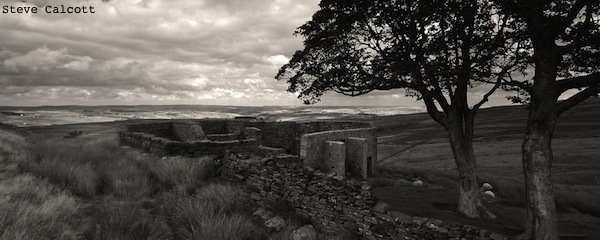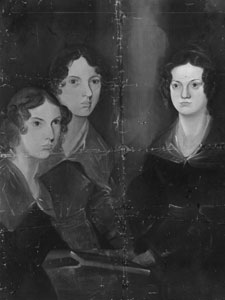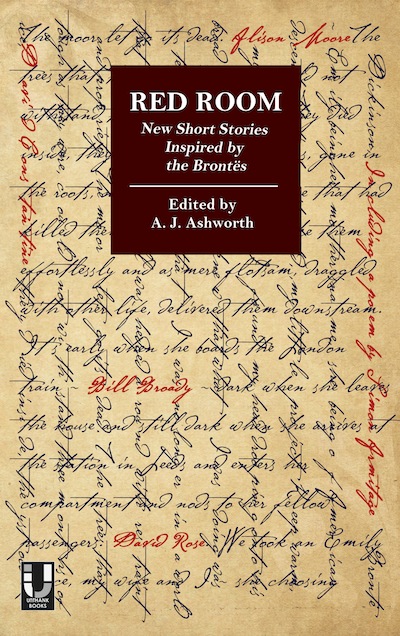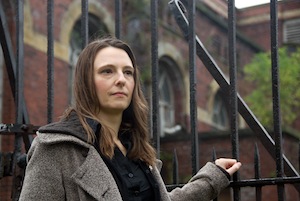
photo by Steve Calcott
by A. J. Ashworth
Some might think it a little unusual to celebrate the lives and works of the Brontë sisters – Charlotte, Emily and Anne – via the short story. After all, the sisters are not known for their short stories, having concentrated on novels and, to a lesser degree, poetry instead. They weren’t unfamiliar with the short form, though; they wrote stories in childhood. Charlotte and Emily also composed ‘devoirs’ (occasionally dramatised short pieces of writing) for homework during their time at a school in Brussels. So, perhaps it is not such an unusual idea after all.
I recently edited a new collection of Brontë-inspired short stories to help raise funds for The Brontë Birthplace Trust – Red Room: New Short Stories Inspired by the Brontës. The Trust, based in the village of Thornton, Bradford, where all three sisters were born, made an appeal at the end of 2012 for fundraising ideas via their Facebook page.  Being a short story writer myself, I suggested that an anthology of Brontë stories might be one small way in which money could be raised, as well as awareness of the Trust. Happily, the group liked the idea, as did Unthank Books, who offered to publish it shortly afterwards.
Being a short story writer myself, I suggested that an anthology of Brontë stories might be one small way in which money could be raised, as well as awareness of the Trust. Happily, the group liked the idea, as did Unthank Books, who offered to publish it shortly afterwards.
Red Room, which came out in November 2013, contains a poem by Simon Armitage and twelve new short stories by some of the best writers working today – all of whom contributed work for no payment in order to support the venture.
The stories interact with the legacy of the Brontë sisters in many different ways, with the writers either drawing on plot, individual lines of text or the Brontës themselves for their inspiration. In her story ‘Bonnet’, V. S. Pritchett Prize winner Carys Davies imagines a heartbreaking but fictional encounter between Charlotte and her young publisher George Smith, with whom she was possibly in love but who did not return her feelings. In ‘The Curate’s Wife – A Fantasy’, Felicity Skelton explores a fictional (and possibly shocking, for hardcore Brontë fans) encounter, this time between Charlotte and another famous figure from history. There is no need to ruin the surprise here by revealing his name.
Other writers used lines from novels as starting points. Booker-shortlisted author Alison Moore took ‘After all, she was a sweet little girl’ from Wuthering Heights to take us into the mind of a young girl dealing with her sour and controlling, new stepfather. Tania Hershman used the first lines of all the Brontë novels to construct something new – a brilliantly strange and surreal tale featuring ‘A Shower of Curates’.
Others were more abstract in their approach. David Rose explored the story of a man who sets about creating a thesaurus – a Brontësaurus – through the use of individual words picked out from Emily Brontë’s poetry. In Sarah Dobbs’ story ‘Behind all the Closed Doors’, a young boy called Henry discovers a family tragedy and carries out an act of vandalism on a Brontë novel in the process. We feel the confusion of the boy and are moved by what happens to him as fragments of text flutter to the ground.
In the collection we also see the wider stories, their themes and characters, providing the inspiration. David Constantine, winner of the BBC National Short Story Award and the Frank O’Connor Prize, explores the redemptive power of love and friendship in his Wuthering Heights-inspired story, ‘Ashton and Elaine’. Rowena Macdonald’s ‘A Child of Pleasure’ brings the portrayal of the governess right up to date by exploring a Villette-like relationship between a tutor and her spoiled, privileged student. Elizabeth Baines examines passion and danger in her contemporary reimagining of a relationship similar to that of Cathy and Heathcliff. Vanessa Gebbie took up the challenge of rewriting a key chapter in Jane  Eyre to provide Jane with a more humorous ‘happy ever after’, while Zoë King imagined a correspondence between Jane and Jane Austen’s famous matchmaker Emma Woodhouse, to great effect.
Eyre to provide Jane with a more humorous ‘happy ever after’, while Zoë King imagined a correspondence between Jane and Jane Austen’s famous matchmaker Emma Woodhouse, to great effect.
Finally, the beautiful and rugged Brontë landscape – and, in particular, a demon-eyed sheep – provided the inspiration for Bill Broady’s hilarious story. ‘Heathcliff versus Sherlock Holmes’ explores the blossoming relationship between two very different people as they go on a trek to Top Withens.
The writers commissioned for the book had free rein to write whatever they wanted, as long as there was some recognisable Brontë element included. And once the stories started arriving, it was exciting to see how each of them had taken up the challenge in a different way. Interesting, too, was reading about the authors’ inspirations, which appear in a section at the back of the book for those keen to know more. The real beauty of the stories is that they can be enjoyed by those who are passionate about the Brontës as well as by those less familiar – or not familiar at all – with their work. There is no specialist knowledge required in order to pick up the book.
A percentage of the profits from sales of the collection will go towards The Brontë Birthplace Trust. In 2012, the Trust hoped to be able to raise enough money to try and buy the Brontë property in Market Street, Thornton, which had sadly fallen into receivership. However, the house was bought privately during the course of putting the book together, and it is now due to open as a coffee shop this spring. The Trust is continuing to be ambitious with its plans, though, and intends to hold a year-long festival in 2015. With the proceeds from this book, we hope to help support the group’s goal of trying to keep this important property and village in the minds of as many people as possible, for as long as possible. Unthank has already sent the first cheque to the Trust and, hopefully, if we can carry on selling copies well into the future, to the bicentenaries of the sisters’ births (which will begin with Charlotte’s in 2016) and beyond, we can continue to reward them for the very good work they are doing.
The book explores interesting territory, so hopefully you will enjoy spending your time travelling through it… you can choose to read each story as a standalone piece or seek out the Brontë links instead. Perhaps you can follow the example of the central character in David Rose’s story, who searches for Emily’s talismanic words… tracking them ‘like deer spoor, through the corpus’.
~
 A. J. Ashworth’s short story collection, Somewhere Else, or Even Here, won Salt Publishing’s Scott Prize and was published by them in 2011. The book was longlisted for the Frank O’Connor International Short Story Award and shortlisted for the Edge Hill Short Story Prize. She is the recipient of Arts Council England funding and a K. Blundell Trust Award from The Society of Authors for her novel-in-progress. She is a Hawthornden Fellow for 2014.
A. J. Ashworth’s short story collection, Somewhere Else, or Even Here, won Salt Publishing’s Scott Prize and was published by them in 2011. The book was longlisted for the Frank O’Connor International Short Story Award and shortlisted for the Edge Hill Short Story Prize. She is the recipient of Arts Council England funding and a K. Blundell Trust Award from The Society of Authors for her novel-in-progress. She is a Hawthornden Fellow for 2014.

